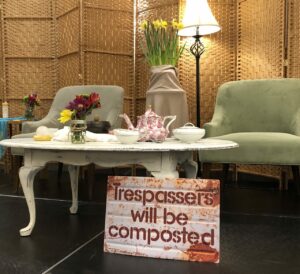By Kathryn White
If you’re squeamish about dead bodies, read no further. For this final of three installments about death and dying in The Gray Zone, we’re going there.

When I sat with my neighbor Judy back in March talking about death cafes (see April’s The Gray Zone), I realized that much of the discomfort with dead bodies I harbored earlier in life had dissipated. The next morning, I stood in the doorway of a downtown conference center peering into a space where I’d spend the next two days for The Body Composting Conference: Rejoining The Cycle of Life Through Natural Organic Reduction.
I was there to learn about the process of composting human bodies that became legal in Washington state in 2019 and then in Colorado in 2021. When the conference took place, New York had just become the sixth state to legalize Natural Organic Reduction (NOR), and another 11 would be looking at it in their spring legislative sessions.
On May 30, Nevada joined Washington, Colorado, Oregon, Vermont, California and New York. The room was filled with a mix of ages and professions, dressed in everything from business suits to recreational apparel to skeleton- adorned T-shirts. Attendees sat around conference tables introducing themselves and conversing about their various connections to the topic.
I squeezed in between an employee of Feldman Mortuary and a woman from Minnesota who had come into town for the event on her own dime. The stage was set like a softly lit reading nook. A small rustic-looking metal sign declaring “Trespassers will be composted” leaned against a coffee table where a mason jar of daisies sat next to an antique teapot.
My shoulders relaxed and I said to myself, “This is lovely.” I texted a picture of the sign to a friend. “LOL…we could put one of those at our front drive,” he replied. The conference was a first of its kind and a bit of a who’s who of the green burial and death-positive movements.

Put on by The Natural Funeral from Lafayette, the first company to provide NOR in Colorado, the conference featured all four companies providing NOR in the U.S. Katrina Spade, who is credited with pioneering the process and who founded the first company to offer it (Recompose), spoke about the history of NOR and its environmental benefits.
“Each person’s soil represents a metric ton of carbon saved,” Spade said.
Human composting avoids emissions from burning fossil fuels (as is needed for cremation and for the manufacture and transport of caskets and headstones) while at the same time sequestering carbon by converting plant and body material into a soil used to regenerate lands in need of biomass and nutrients.
For two days, attendees sat rapt while scientists, professionals from funeral homes and the founders of all four companies that provide NOR shared information. Families who have chosen NOR for a loved one shared their stories.
At the end of the first day, the room was converted into a tender re-enactment of what The Natural Funeral called the “laying in,” a memorial service built around the placing of the body and organic material into the vessel where decomposition will take place.
The “laying out” ceremony takes place two to four months later, after the body and surrounding material have been turned into approximately one cubic yard of soil. In 2011, a decade before human body composting became legal in Colorado, another earth-friendly alternative to fire cremation and casket burial was added to our options in Colorado.
Be A Tree Cremation is Denver’s sole provider of alkaline hydrolysis. The company’s founder, Colorado native Emily Nelson, reports that community interest in the service is growing. Nelson started the business three years ago after working in what she refers to as the corporate death care industry.
She hadn’t known that the process of returning bodies to the earth often involved toxic chemicals, a concrete vault barrier between casket and the ground, or fire-cremated remains too high in pH levels and sodium content to be beneficial where scattered.
Looking back on the burials of loved ones, including her own mother who died when she was young, Nelson felt cheated. Alkaline hydrolysis, also known as water cremation or aquamation, utilizes a water- based process of approximately 95% water and 5% alkali to accelerate the break-down of body tissue. Its environmental impact, like NOR, is a fraction of that produced by fire cremation and casket burial.
What remains after aquamation is a solution Nelson calls Tree Tea, a sterile water mixture of amino acids, peptides and sugars. And bone fragments, similar to NOR and fire cremation. A machine called a cremulator then pulverizes cremated bone remains into a fine grain that family can make arrangements for, much like they would with ashes from fire cremation.
Tree Tea can be utilized by the family, incorporated into the planting of a tree, or applied by Nelson and her team at one of Be A Tree’s six land partnership locations. Companies like Be A Tree and The Natural Funeral guide families through a host of ways we can make returning our bodies to the earth actually beneficial for the earth.
Coloradans appear to be a receptive audience for these and other natural burial innovations. 138 people attended The Body Composting Conference downtown, and another 180 joined by livestream. It’s not surprising, I suppose.
We break significantly from national trends on casket burial versus flame cremation. Data from The Cremation Association of North America shows Colorado in the top 10 for percentage of deaths cremated. In 2021, the U.S. cremation rate was 57.5%. In Colorado it was 75.1%.
Kathryn has lived in north Denver since around the time the Mount Carmel High School building was razed and its lot at 3600 Zuni became Anna Marie Sandoval Elementary. She’s raised two children in the neighborhood, worked at several nonprofits and volunteered with the Alzheimer’s Association Colorado Chapter.

Be the first to comment